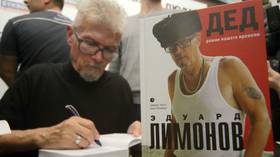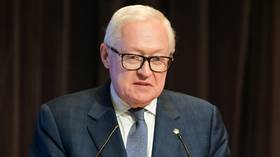Eduard Limonov, Soviet-Era dissident & writer who shocked Russia, dead at 77
Eduard Limonov, who has died in Moscow, was a one off. A Soviet-era dissident, his controversial 1970s memoir 'It's me, Eddie' scandalized Russia when first published in the country in 1991, selling over a million copies.
His death was announced by State Duma (national parliament) deputy and chief editor of 'Yunost' magazine Sergei Shargunov. Limonov's assistant Dmitry Sidorenko subsequently confirmed it to Moscow daily RBK. He didn't specify a cause of death, but Russian media suggested it was due to complications from surgery.
Shargunov told the TASS news agency that Limonov died on Tuesday evening at a hospital in Moscow. "He had his wits about him to the end, and was talking, he remained of sound and clear mind," the MP explained.
Russian writer, political activist Eduard Limonov has died today at the age of 77. Honest, talented, provoking. A Lord Byron of modern times. R.I.P. pic.twitter.com/KqaqezSGUK
— History Lovers Club (@historylvrsclub) March 17, 2020
Born in Russia's Nizhny Novgorod (then Gorky) region in 1943, as Eduard Savenko, to a military family, Limonov mostly grew up in Kharkov, in Soviet Ukraine. He moved to Moscow in the 1960s where he wrote poetry and became active in literary circles. in 1973, Limonov and his second wife, Elena Shchapova, emigrated from the USSR. Soon after, she left him later marrying an Italian Count.
Limonov settled in New York, working for a Russian-language newspaper and immersing himself in radical politics and the punk sub-culture. He complained about harassment from US authorities, writing that "the FBI is just as zealous in putting down American radicals as the KGB is with its own radicals and dissidents... [but] the methods of the FBI are more modern."
He later detailed this period in 'It's me, Eddie' where he graphically illustrated casual sexual encounters with homeless people, alongside other unconventional behavior. In France, where it first achieved fame, it was titled The Russian Poet Prefers Big Blacks (Le poète russe préfère les grands nègres).
Disillusioned with America, Limonov relocated to Paris in 1980. There he become close with the leaders of the French Communist Party.
France suited him better, with his work finding a receptive audience. He remained popular in the country over the following decades. In 2011, the French film director, and writer, Emmanuel Carrère wrote a best-selling biographical novel based on the Russian's life and times, bringing him to a new audience.

As a newly constituted Russia emerged from the Soviet collapse, Limonov returned to Moscow and took Russian citizenship. He had been stateless from 1974 to 1987, when he acquired a French passport, which he would later relinquish.
Around this time, as Russia opened up, most of his writing was first published at home. It's Me, Eddie stunned a conservative Russian society emerging from the totalitarian isolation of the USSR-era, with its hardcore depictions of homosexual acts involving the narrator.
In Moscow, he set up a magazine 'Limonka' and founded an ultra-nationalist political party, called the 'National Bolsheviks.' It advocated for Russia to create a huge empire, dominating all of Europe and north and central Asia. The movement, seen as a midpoint between communism and fascism by Limonov's then ally, controversial philosopher Alexander Dugin, was outlawed.
In the 1990s, Limonov was already agitating for Crimea to be returned to Russia. He also passionately supported Bosnian Serbs in the Yugoslav wars and was once notoriously filmed shooting a gun in the hills above Sarajevo, in the presence of Radovan Karadzic, who was later jailed for war crimes.
He began writing in English, for Moscow ex-pat magazines Living Here and the eXile, whose former editor, Mark Ames, described him on Tuesday as "the last great Russian writer."
Never wasted a day of life. RIP to the last great Russian writer.https://t.co/k6XBvApIpr
— Mark Ames (@MarkAmesExiled) March 17, 2020
An arrest followed, in 2001, on terrorism charges when he was accused of planning to raise an army to invade Kazakhstan and of possessing weapons. Limonov dubbed the trial ridiculous, but he spent two years in jail over the affair.
Limonov, who had been strongly opposed to Vladimir Putin since he was first elected to the Kremlin in 2000, became active in the Moscow protest movement, leading the Other Russia campaign, along with chess legend Garry Kasparov and Human Rights activist Lev Ponomarev.
He decided to run for president himself in the 2012 Russian election. However, the Central Election Commission denied him registration. A year later, he broke with his liberal opposition allies when he strongly condemned the pro-Western "Euromaidan" protests in Kiev. Subsequently, Limonov labelled them "traitors" after they opposed Russia's 2014 reabsorption of Crimea, which he vocally backed.
Like many Russians, his nationalism became more pronounced during the Ukraine crisis, and his rhetoric more hardline. He called for the closure of "enemy" opposition media and suggested pro-Western journalists be "expelled" from the country. In 2016, he began to write a regular column for RT's Russian-language service.
Limonov was married four times, to artist Anna Rubinstein, the aforementioned Shchapova, poet and singer Natalia Medvedeva and actress Ekaterina Volkova. With the latter, he had two children, a son Bogdan (now 13) and a daughter Alexandra (now 11). The couple separated in 2008, but Volkova said Limonov was a hands on father, actively involved in raising his children.
When fellow Soviet-dissident and writer Alexander Solzhenitsyn died in 2008, Limonov was scornful. "The ideological death of Solzhenitsyn took place the night after the Soviet Union fell in 1991," he ventured. "What came after was a sort of life after death."
Whether or not that was true of Solzhenitsyn, the same certainly could not be said of Eduard Limonov.
- Eduard Veniaminovich Savenko (better known was Eduard Limonov) was born on 22 February, 1943 in Dzerzhinsk, USSR. He died in Moscow, Russia on 17 March, 2020.














